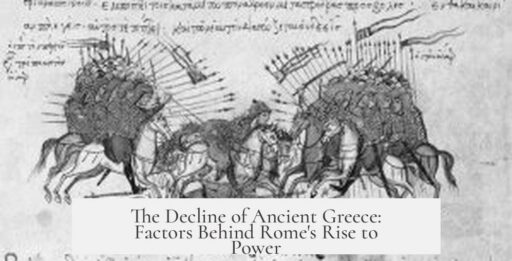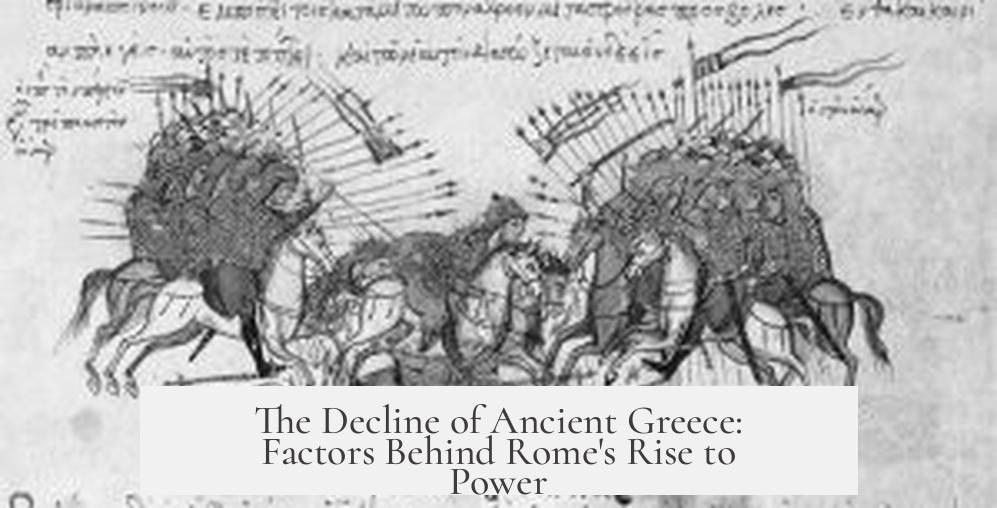The decline of Ancient Greece after the rise of Rome occurred primarily due to Rome’s military conquest, the lack of political unity among Greek city-states, and the internal weakening of Greece before Roman dominance. Greece lost its independence and political significance for centuries, yet retained cultural influence under Roman rule.
Rome conquered Greece over about a century of conflicts with the Roman Republic. This process ended with Greece’s final absorption into the Roman Empire in 31 BCE. Once conquered, the many independent Greek city-states ceased to exist as political entities and became subject territories governed by Rome.
One critical factor in Greece’s decline was its failure to unite politically. Ancient Greece consisted of dozens of city-states, such as Athens, Sparta, and Thebes, each with its own armies, governments, and interests. They shared language and religious customs but had no permanent political unity. Temporary alliances were weak and often short-lived.
- The Greek city-states frequently rivaled and fought each other.
- They lacked centralized leadership or a combined military strategy.
- This disunity left them vulnerable to the organized and resource-rich Roman military.
While Greeks resisted Roman advances at times, internal competition weakened their overall defense. Unlike the Romans, who centralized power in a republic with a unified military, Greek city-states acted like fragmented regional powers.
The decline of Greece started even before Rome became a major power. After the rise of Macedon under King Philip II and later his son Alexander the Great, Greece itself had entered a slow downward trajectory. The aftermath of Alexander’s conquests shifted population centers abroad, draining some parts of Greece proper.
Following Alexander’s death, many Greek city-states faced internal conflict and civil wars. Athens and Sparta, once dominant powers, struggled with societal decline and reduced influence. The kingdom of Macedon faltered militarily and politically, giving Rome an opening to expand.
Rome’s advantages became decisive. Rome possessed:
- A well-organized government system capable of managing large territories.
- Greater population and access to vast resources, especially agricultural wealth from Italy.
- An advanced and adaptive military with innovative tactics superior to those of Macedon.
This organizational and resource superiority allowed Rome to gradually subdue Greece despite Greek cities’ historical military reputations.
Although Greece lost political control and faded from high-level political history, its cultural influence remained strong. Greek language, arts, philosophy, and ideas continued to thrive within the Roman Empire.
The Byzantine Empire, which followed later, was heavily Greek in language and culture. Roman elites deeply admired Greek achievements, and Greek became a lingua franca in the eastern Roman world. Hellenization had spread Greek culture widely across the Mediterranean and Asia.
Economic factors also contributed to Greece’s relative decline. As Rome became the empire’s economic heart, trade routes favored larger urban centers closer to Africa and Asia. Greece’s geographic position reduced its economic significance. It struggled to maintain its markets as Rome grew in prominence.
| Factor | Explanation |
|---|---|
| Roman Conquest | Greece lost political independence after being conquered by Rome, ending its city-states’ sovereignty. |
| Lack of Unity | Disunited city-states weakened collective defense capabilities against Rome’s organized republican system. |
| Internal Decline | Post-Alexander internal strife and civil wars weakened Greek political and military strength. |
| Roman Advantages | Rome’s government, military, population, and resources outmatched Greek capabilities. |
| Cultural Continuity | Greek culture influenced Roman society and the Byzantine Empire despite political decline. |
| Economic Shifts | Rome’s central location in trade reduced Greece’s economic significance. |
Ultimately, Ancient Greece’s decline after Rome’s rise was not a sudden collapse but a drawn-out process influenced by internal weaknesses and the rise of a far more powerful neighbor. Despite losing sovereignty, Greek civilization left a lasting cultural legacy absorbed and propagated by Rome and later empires.
- Greece fell due to Roman conquest and lack of political unity among city-states.
- Internal decline predated Roman dominance, especially after Alexander the Great’s era.
- Rome’s structured government, military, and resources enabled it to dominate Greece.
- Greek culture remained influential within Roman and Byzantine worlds.
- Economic shifts favored Rome, diminishing Greece’s trading role.
How and Why Did Ancient Greece Decline So Much After the Rise of Rome?
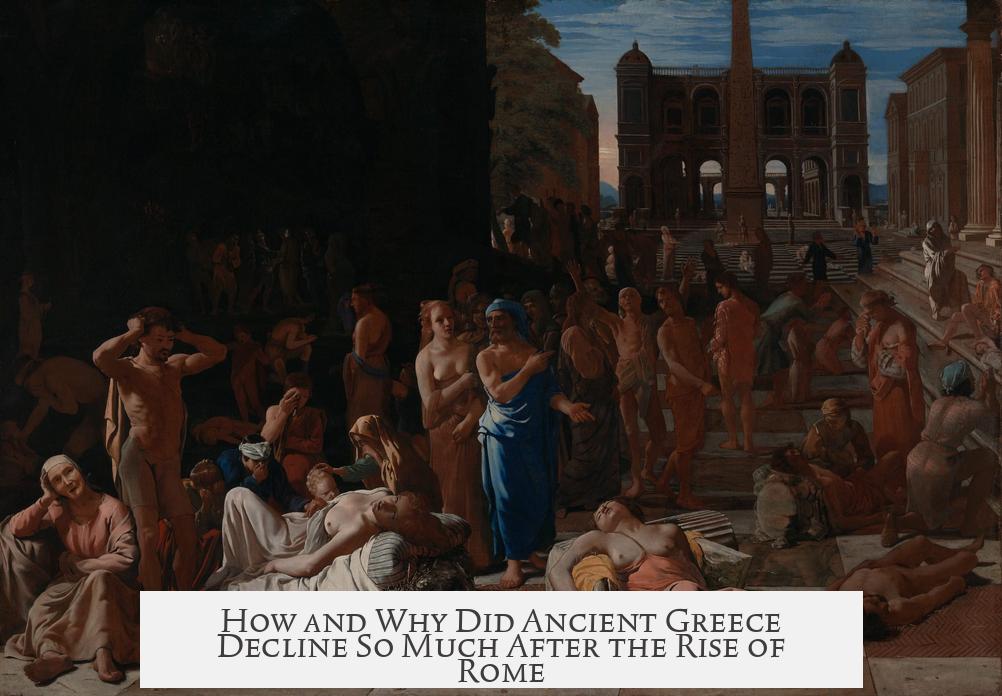
In short, Ancient Greece declined after the rise of Rome because Rome conquered Greece, absorbed its city-states, and outmatched them with superior organization, unity, and resources. But there’s so much more to this story—like why Greece’s famed city-states fell short against the Roman machine and how Greek culture never really went extinct. Let’s unpack this historical drama, step by step, with all the juicy details.
First, imagine the Greek city-states as dozens of fiercely independent mini-kingdoms, each waving their own flags, fiercely protective of their own interests. They shared language, religion, and customs, sure. But political unity? Not so much. It’s like a neighborhood with many houses but no homeowner association to enforce community rules.
Meanwhile, Rome looked more like a well-oiled government and military machine. It had a centralized political system designed to rule vast territories efficiently. The Roman Republic, and later Empire, could gather resources, organize armies, and govern lands with impressive skill. This contrast set the stage for Greece’s decline.
Rome’s Conquest: The Slow March to Domination
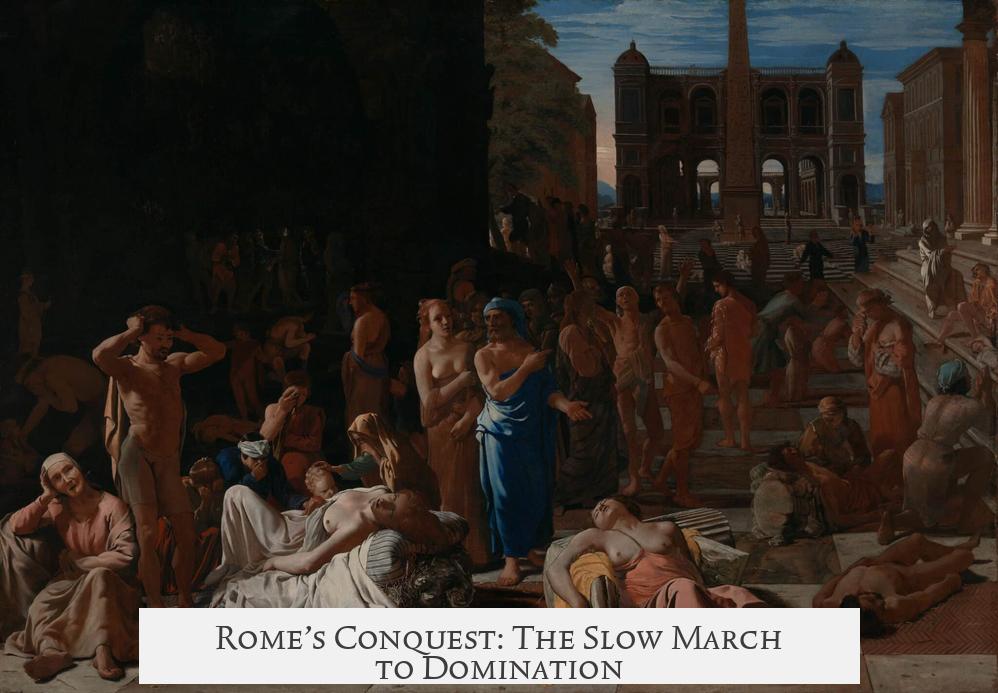
The Roman conquest of Greece wasn’t an overnight takeover. It stretched over a century-long chess match. Greece lost several conflicts to Rome between 200 and 31 BCE, culminating in the Battle of Actium and Greece’s final subsumption into the Roman Empire. For roughly 400 years, Greece became just another Roman province.
Once conquered, the fiercely independent city-states got absorbed. No more Spartan or Athenian independence; just Roman subjects. This meant Greece was no longer a key political player on the world stage. It had dropped out of the high-level history bulletins—at least politically.
Why Weren’t Greek City-States Unified? Blame the Ego (and Geography)
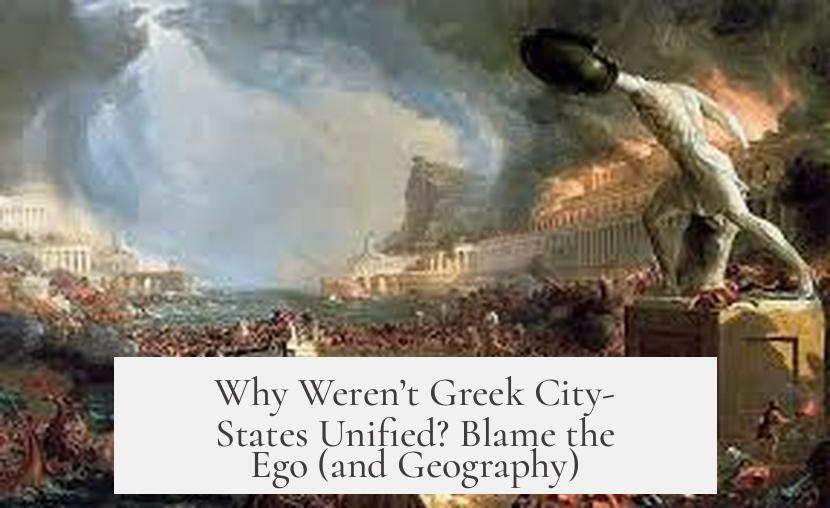
The ancient Greeks had a great idea in theory—unity through culture and language. But in practice, they were a patchwork quilt, not a single blanket. Each city-state had its armies, traditions, and rivalries. When threats loomed, such as Roman invasions, these city-states often argued or waited to see who got attacked first. That hesitation proved fatal.
The lack of centralized government or unified national defense made Greece vulnerable. Hundreds of small rivals against one united and organized empire? The odds were never in Greece’s favor. Even the mighty Spartans and democratic Athenians couldn’t find common ground to mount a unified defense.
Greek Decline Was Brewing Before Rome Even Rose

Hold on. Greece wasn’t exactly thriving right before Rome entered the scene. Its decline had begun well before, after Alexander the Great’s death. The Greek heartland did see population shifts; many moved to newer, bustling cities like Alexandria, founded by Alexander. Meanwhile, Athens and Sparta were caught in civil wars. These internal conflicts sapped strength and left the region ripe for external conquest.
And let’s not forget Macedonia’s rise under Philip II, Alexander’s father, which already diminished traditional Greek power. By the time Rome came knocking, Greece was already struggling.
Rome’s Secret Sauce: Organization, Military, and Resources
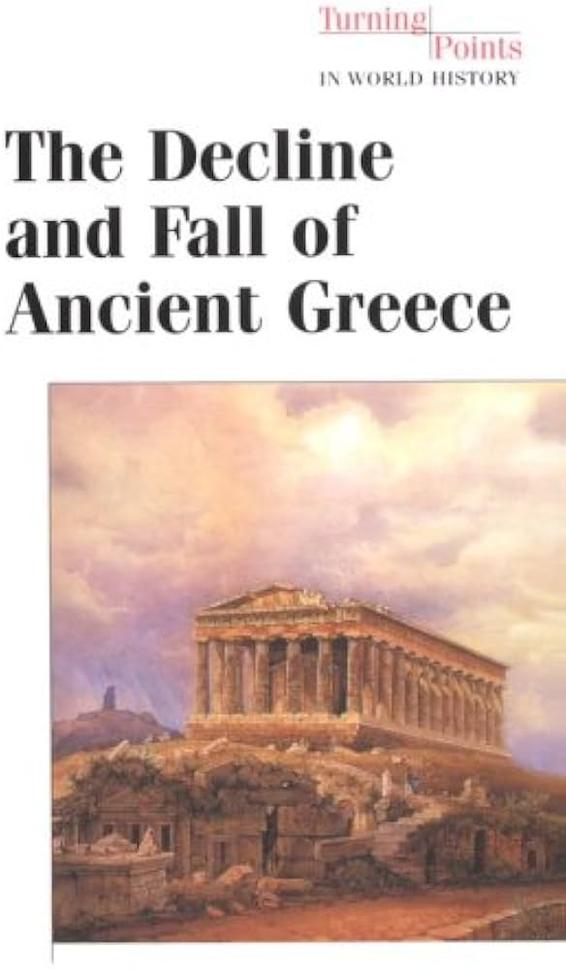
Rome was no amateur when it came to ruling a huge empire. It had an administrative system designed to keep diverse lands in line. Rome’s military was large, professional, and well-funded—thanks to fertile Italian lands and efficient tax systems.
Compare this to the Greeks. Macedonians had started to innovate militarily, but eventually stagnated. Rome took those ideas, ran with them, and outclassed everyone. Large population plus deeper pockets meant Rome could sustain prolonged campaigns and governance where Greece simply couldn’t.
Was That the End of Greek Culture? Not Quite!
Even though the political scene dimmed, Greek culture lived on, bright as ever. Rome itself admired Greek philosophy, arts, and literature so much that its elite often spoke Greek. The Romans even borrowed heavily from Greek architecture, theatre, and religion.
Did you know the Byzantine Empire, which followed Rome, spoke Greek? It was essentially Greek culture under another name. So culturally, Greece wasn’t really gone—it just changed hats.
Greek culture’s impact, known as Hellenization, reached beyond Europe, influencing Asia and the Mediterranean for centuries. So in a sense, Greece’s ultimate victory was cultural, not political.
Why Did Greece Lose Economic Importance?
Rome became an economic superhub, conveniently located for trade routes from Africa and Asia. This geographic advantage pulled commerce away from Greece. Fewer customers and less trade meant Greek cities had shrinking economies, contributing to their decline.
Takeaways: What Can Today’s Readers Learn?
- Unity is power. Greece was a brilliant but divided patchwork. Rome showed what a united and organized system can do.
- Culture can outlive politics. Greece’s cultural legacy is a marathon, not a sprint. Political defeat didn’t erase their ideas or their influence.
- Geography and resources matter. Rome’s access to fertile lands and trade routes gave it a leg up economically and militarily.
So, why did Ancient Greece decline after Rome’s rise? Because Rome was a united, resource-rich giant taking over a collection of squabbling city-states already in slow decline. But Greece’s true strength was never just in armies or politics—it was in ideas that outlived empires.
Next time you admire a marble statue or quote Plato, remember: the Greeks may have lost their wars, but they won the world’s culture game.
